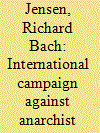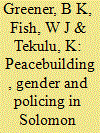|
|
|
Sort Order |
|
|
|
Items / Page
|
|
|
|
|
|
|
| Srl | Item |
| 1 |
ID:
087828


|
|
|
|
|
| Publication |
2009.
|
| Summary/Abstract |
While emotions are at the core of human behaviour, they have received little attention in conceptions of international policing where only 'rational' behaviour tends to be taken seriously. This blind spot is problematic, inter alia because it leads to an impoverished understanding of what contributes to the successes or failures of peace operations. This article makes a foray into this space, positing that a better understanding of the relationship between emotions (of local and intervening actors alike) and international policing performance could lead to improvements in mission design as well as implementation. The article identifies methods with the capacity to assess performance through the lens of emotion.
|
|
|
|
|
|
|
|
|
|
|
|
|
|
|
|
| 2 |
ID:
087355


|
|
|
|
|
| Publication |
2009.
|
| Summary/Abstract |
This essay presents a short overview of the "classic" era of anarchist terrorism between 1880 and World War I, while concentrating on an analysis of the little-known efforts by diplomats, politicians, and the police to control and repress anarchist terrorism. These efforts included the Rome Anti-Anarchist Conference of 1898 and the St. Petersburg Protocol of 1904. Before World War I, a combination of economic, social, and political factors, combined with a systematic government effort to redefine and downplay the nature and importance of anarchist terrorism provides the best explanation for why this form of violence declined in certain countries but not in others. Careful police intelligence work and international police cooperation, together with a more rigorously professional system of protection for monarchs and heads of state, could aid in reducing the problem of anarchist terrorism, but heavy-handed repression only worsened it. The essay concludes with a sketch of anarchist terrorism after 1914 and a brief comparison between present-day terrorism and its nineteenth-century predecessor.
|
|
|
|
|
|
|
|
|
|
|
|
|
|
|
|
| 3 |
ID:
113816


|
|
|
|
|
| Publication |
2012.
|
| Summary/Abstract |
The idea of creating an international police force (IPF) was first mooted by Lord David Davies in the 1930s. In 1963 U Thant, Secretary General of the United Nations, then claimed that he had 'no doubt that the world should eventually have an international police force'. Yet our international system has been and continues to be based on states, their sovereignty and a correlative 'inside/outside' distinction: a distinction which is resistant to this idea of some form of systematic international policing writ large. Instead of the establishment of an IPF, a new form of international policing has emerged through the unprecedented use of police abroad and the potential consolidation of more specific operational policing norms. This is a phenomenon that may not be as permanent nor as wide ranging as earlier conceptualisations that concerned themselves with a more structured management of interstate behaviour, but, nonetheless, it increases the possibilities for achieving an international order based on the rule of law.
|
|
|
|
|
|
|
|
|
|
|
|
|
|
|
|
| 4 |
ID:
078699


|
|
|
|
|
| Publication |
2007.
|
| Summary/Abstract |
Facing sophisticated, resistant, and highly motivated terrorist and trans-national crime threats and numerous difficulties inherent in countermeasures, law enforcement and security providers have shifted from a bureaucratic and hierarchical approach toward a networking morphology. This trend more adequately equalizes the capacities of law enforcement authorities to combat fluid and flexible criminal networks. This article highlights new cooperation mechanisms that are being added to the existing instruments available to law enforcement agencies. The emphasis is on the role of informal initiatives by members of the law enforcement community. Based on the generally accepted assumption that state-driven initiatives generally constrain the level of contributions that formal international agreements can provide, we suggest that the staff of international organizations alter the environment in which law enforcement agencies must collaborate. This will enable the organizations to act as informal entrepreneurs that thrive in building the capacity of states to enhance their participation rates in international systems of information exchange and joint strategy development.
|
|
|
|
|
|
|
|
|
|
|
|
|
|
|
|
| 5 |
ID:
107840


|
|
|
|
|
| Publication |
2011.
|
| Summary/Abstract |
Although the concept of partnership offers little substantively new to the theory and practice of peace operations, it provides a useful political frame to advance reform efforts in UN policing. In the last few years, several improvements have been made in doctrine, training and increasing the pace of deployment. However, the case of Timor-Leste suggests that these efforts have not resulted in obvious improvements in the abilities of the UN Police (UNPOL) to carry out their mandated functions. Solutions offered by the New Horizon agenda are technical and do not address the political dimensions of the problems encountered in field missions. In Timor-Leste, the host government is not interested in engaging in a partnership with UNPOL. Problems with international policing may be so deep, complex and subject to politics that even substantial process-oriented solutions will not achieve significant results.
|
|
|
|
|
|
|
|
|
|
|
|
|
|
|
|
| 6 |
ID:
103958


|
|
|
|
|
| Publication |
2011.
|
| Summary/Abstract |
UN Security Council Resolution 1325 calls for a gender perspective to be integrated into the resolution of conflicts. This responsibility manifests itself in a number of more specific proposals, some easily assessable, others less so. In this paper, we begin by considering the success of the Regional Assistance Mission to Solomon Islands (RAMSI) - the poster child for peacebuilding efforts - at meeting these specific proposals. In light of this, we then go on to suggest ways in which RAMSI might meet greater success in fully integrating gender considerations in Solomon Islands by blending sensitivity to gender-based considerations together with a deeper sensitivity to cultural considerations, including cultural understandings of core notions such as 'policing' and 'justice'.
|
|
|
|
|
|
|
|
|
|
|
|
|
|
|
|
| 7 |
ID:
178399


|
|
|
|
|
| Summary/Abstract |
The UN Department of Peacekeeping Operations has undergone significant changes in its organisation since 1948. A new global environment established by the end of Cold War, elevated the Police Division to a more pronounced role in international peace as an essential pillar of UN peacekeeping missions. Nonetheless, despite the increased role of police in international missions, research on police contributions to peacekeeping remains limited. This article addresses this gap in literature by highlighting the case of Turkey’s contribution to UN international police peacekeeping missions. The article confirms empirically that the Turkish police contribution has increased since the 2000s by relying on quantitative data offered by the TUBAKOV dataset designed to collect data on international peacekeeping missions of Turkey. The paper contends that, besides global trends, the increased participation of Turkey in UN-led missions reflects its internal political dynamics. First, under the JDP rule, Turkey’s Cold War era subtle foreign policy was transformed to a proactive policy in global politics. Second, since the 2000s, the transformation of civil–military relations has ended the system of military tutelage, and this has had a considerable impact on foreign policy. Civilian authority, by abolishing military dominance, has become the primary actor in foreign policy decision-making.
|
|
|
|
|
|
|
|
|
|
|
|
|
|
|
|
|
|
|
|
|